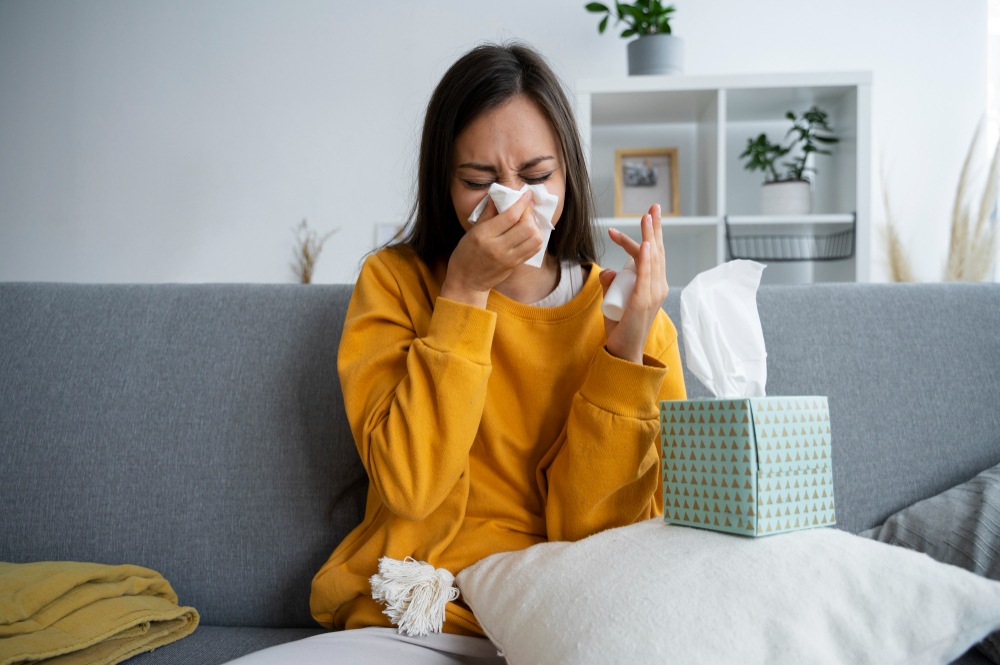CONTACT US: 0919 058 5858 | 02 899 51920
CONTACT US:
0919 058 5858 | 02 899 51920
Have you noticed more people getting sick lately? Whether it’s your preschooler feeling under the weather, a co-worker calling in sick, or your kasambahay running a temperature, it’s an indication that the flu is making the rounds again. With busy schedules and constant exposure to crowds, maintaining good health has become a significant challenge in today’s fast-paced world.

The flu—short for influenza—is defined by the World Health Organization (WHO) as an acute and contagious respiratory infection caused by influenza viruses. Although the common cold and the flu share many symptoms, they are two different illnesses. The flu typically has symptoms that are more intense and start more abruptly like high fever, chills, runny or stuffy nose, cough, sore throat, body aches, and headache. Whereas cold symptoms are typically milder than the flu. Other possible symptoms of the flu are fatigue, vomiting, and diarrhea.
Most people bounce back from the flu within a week or two, but it can sometimes lead to serious complications. Vulnerable groups, including young children, the elderly, pregnant women, and those with existing health problems, have a higher risk of flu complications. According to the Centers for Disease Control and Prevention (CDC), some people can develop moderate complications such as sinus and ear infection, while others may experience serious complications such as pneumonia. The latter may be life-threatening and result in death.
Here in the Philippines, Department of Health (DOH) Secretary Teodoro Herbosa noted that the country tends to experience a spike in flu cases during the “-ber” months. He explained that the recent rise in influenza-like illnesses (ILI) is a seasonal pattern rather than an outbreak. Still, with the changing weather and the arrival of the northeast monsoon (amihan), it’s no surprise that more Filipinos are catching the flu lately.

In this age of hectic work schedules, prevalent sedentary lifestyles, late night activities, and poor eating habits, it’s easy to forget that our bodies need rest and protection. But staying healthy doesn’t have to mean a total lifestyle overhaul—just a few mindful habits can make a big difference.
Getting a regular flu shot is one of the easiest and most effective ways to protect yourself and your family during flu season. Some people skip it, thinking it’s unnecessary or reasoning out that they “never get sick,” but the truth is, even healthy individuals can catch the flu. According to the Mayo Clinic, while a flu shot may not guarantee 100% protection, it greatly reduces your chances of catching the flu or makes symptoms much milder if you do get infected. For vulnerable groups, a flu shot acts as a strong layer of defense and prevents severe complications.
If you or your child exhibit signs of ear infection, it’s best to consult a doctor for proper assessment and treatment. For peace of mind, having a prepaid emergency health card Philippines gives you access to quality medical care when you need it most. Remember that timely care is essential to overall wellbeing.
Medicare Plus encourages you to get an annual flu shot because flu viruses constantly change. This means that vaccines must be updated to protect against the most current strains.
Eating balanced meals, drinking enough water, getting optimal sleep, and taking care of your mental health are crucial to your overall well-being. Remember that a well-rested body fights off viruses better than a tired, stressed, and sleep-deprived one.
In this modern and on-the-go world, our hands are constantly touching things—phones, tablets, computer keyboards, elevator buttons, self-checkout kiosks, and more. Make it a habit to wash your hands often with water and soap, and sanitize surfaces when necessary.
Health Secretary Herbosa urges Filipinos with flu-like symptoms to stay home and rest as much as possible. This can prevent infecting others, especially the elderly and those with other health conditions, like cancer and diabetes.
Although some might find it tempting to keep working or running errands, especially when deadlines pile up, staying home to recover helps you get better faster and prevents spreading the flu.
Having a Family Healthcare Plan Philippines ensures that you and your loved ones have easy access to essential health services—from vaccinations and checkups to emergency care. A dependable plan promotes preventive care and gives you peace of mind knowing that if anyone in the family falls ill, help is always within reach.
The flu season serves as a reminder that health is something we can’t take for granted—especially in this modern and fast-paced world. Protecting yourself and your loved ones from the flu involves simple but consistent actions: getting a regular flu shot, building your immunity, practicing good hygiene, and resting when needed. But most of all, having a trusted Family Healthcare Plan gives you the assurance that professional medical care is always within reach.
Stay safe and strong—flu season or not, your family’s health should always come first.

Easy access health plan options for the Filipino community.
We know finding the right healthcare plan can be a complex and confusing task.
Our health plan specialists are always here to help 24/7.
Got more questions?